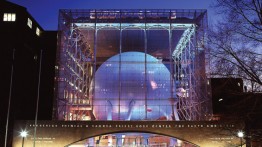COOPERMADE: Capital Projects for Non-Profits

For generations of New Yorkers, the Hayden Planetarium at the American Museum of Natural History (AMNH) was a beloved destination for school field trips, afternoons of wonderment, and rock-and-roll laser light shows. But by the late 1990s, the original planetarium, which was built in 1935, was demolished to make way for The Rose Center for Earth and Space which opened in 2000, an extraordinary addition to the museum that was shepherded by the firm of civil engineering graduate Marty Zubatkin CE'77.
In 1994 when he founded his company, Zubatkin Owner Representation LLC (ZOR), Zubatkin focused on the needs of the not-for-profit community, in building new and renovated facilities for their strategic development and vision. This focus was the outgrowth of his work with his mentor Frederick P. Rose during his 13 years at Rose Associates—the prominent NYC developer—and Fred Rose’s active involvement as a member of the Board and generally the head of the building committees for many cultural organizations in the City.
The objective of ZOR was to fill the gap that many not-for profits experienced in the active professional management of their capital projects. To provide leadership, technical and business savvy, and a partnership with the organizations it serves. To foster a collaborative environment and challenge the project team to provide the best overall solutions for its clients in getting value for every dollar spent and pro-actively managing budgets, schedules and quality.
Today, the firm of more than 65 professionals including architects, engineers, construction professionals’ and financial cost and schedule specialists provides owner representation and project management services for museums, religious and community facilities, performing arts venues, educational facilities and private development from the conceptualization of projects through programing, design, construction and start-up operations. Its portfolio of projects includes over 100 museum projects including work at AMNH for the last 25 plus years, 9/11 Memorial and Museum, Clark Art Institute, Bethel Woods Center for the Arts, USGA Museum, MoMA and Planet Word. Currently the firm is working on museum projects including the Richard Gilder Center at AMNH, Studio Museum in Harlem, New York Historical Society, Connecticut Historical Society, Jackie Robinson Foundation, Buffalo AKG Art Museum, USGA, and the National Museum of Mathematics.
Some other notable projects over the last 28 years include the restoration of St. Patrick’s Cathedral, Ronald McDonald House, Park Avenue Armory, The Century Association, Council on Foreign Relations, UJA-Federation of New York, Educational Alliance, Madison Square Boys and Girls Club, renovations of the Lyric and Hudson Theatres, New Victory Theatre, and multiple private and Charter schools.
Zubatkin says, “Implementing construction projects is difficult. They are the costliest initiatives our clients undertake. Clients look to us to provide the leadership, management and technical expertise to achieve their vision and objectives, to get them the value they deserve and make their well-conceived projects, great. Our success is about getting this done and being chosen or referred to others to do their next project. We consider it a “privilege” to serve the not-for-profit organizations that are so vital to the cultural, social, and economic health of our community and the people that they serve.”





